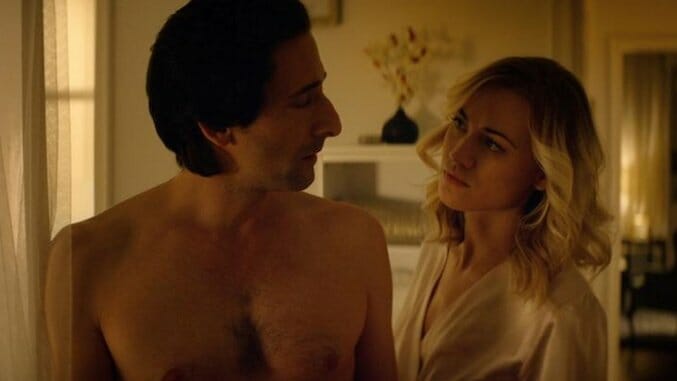Manhattan Night

Manhattan Night is a twisty thriller that somehow manages to surprise and entertain despite employing nearly every trope from film noir. Written and directed by Brian DeCubellis (in his first feature) and based on Colin Harrison’s 1996 novel Manhattan Nocturne, the film not only borrows stylistic elements from noir standard-bearers such as Double Indemnity and The Big Sleep, it combines them with touches of erotic whodunits such as Basic Instinct and Dressed to Kill. DeCubellis overdoes his homage, however—the result is a second-rate potboiler.
To wit: There’s the past-his-prime hero, played by Adrien Brody as New York newspaper crime columnist Porter Wren. He introduces himself and his sad-sack tale through voiceover (naturally). He’s a family man, seemingly devoted to busy doctor Lisa (Jennifer Beals) and their two kids. As Porter drives the city looking for his next scoop, moving from one grisly murder to the next tragedy, his journey’s often accompanied by a gloomy jazz tune in the background.
At a business function, Porter meets Caroline Crowley (Yvonne Strahovski), an enigmatic blonde/femme fatale who asks him to look into the unsolved murder of her eccentric filmmaker husband, Simon (Campbell Scott). Though Porter’s not sure about taking the side gig, Caroline cajoles and explains—over many drinks and smokes back at her place—that Simon’s body was found in the rubble of a demolished building. She knows there’s more to the story, and doesn’t buy what’s in the official police report. Of course, Porter can’t resist the case or the girl, and he uncovers a bigger plot involving blackmail and sexual obsession that could put his career and his and his family’s lives in danger.
The conflict arises from a number of red herrings that involve Simon and Mr. Hobbs (Steven Berkoff), a billionaire media mogul who happens to be the new owner of Porter’s newspaper. The convoluted plot, which tangentially explores themes of privacy and control, turns out to be Manhattan Night’s saving grace. The mystery is somewhat engaging, despite an overabundance of plot contrivances. (There’s less screen time to watch the characters skirt the line into caricature.)
Brody’s sad, expressive eyes and distinct visage are perfect for Porter’s haggard countenance and flawed character. While there’s no doubt in anyone’s mind that he’ll sleep with the younger Caroline, the scenario in which it happens is ridiculous. Spoiler alert: They don’t have sex after the first night of flirting in her apartment because Porter must have a few scenes of struggling with his conscience first. But after a second meeting at her apartment to discuss her husband’s death, he reaches the elevator only to realize he forgot his phone. He sneaks back into the apartment, and in those two minutes Caroline’s already in the shower pleasuring herself. She sees her voyeur, and instead of kicking him out, they end up coupling against a wall. The scene feels so inorganic—and staged.
-

-

-

-

-

-

-

-

-

-

-

-

-

-

-

-

-

-

-

-

-

-

-

-

-

-

-

-

-

-

-

-

-

-

-

-

-

-

-

-








































